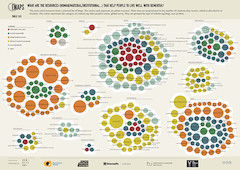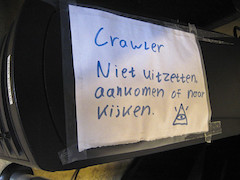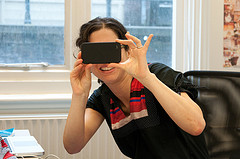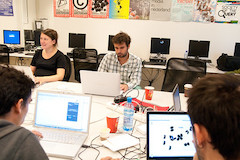You are here: Foswiki>Dmi Web>SummerSchool2022 (13 Sep 2022, WarrenPearce)Edit Attach
Vision methodologies: New visual analysis online
Digital Methods Summer School and Data Sprint 2022




Digital Methods Summer School and Data Sprint 2022 4-15 July 2022
https://wiki.digitalmethods.net/Dmi/SummerSchool2022
In-person Opening time and location:
4 July at 9.15am Amsterdam time. Location: OMHP, Oudemanhuispoort 4-6, Amsterdam, room C0.17. Please be punctual.
Everyday location:
Media Studies
Turfdraagsterpad 9
1012 XT Amsterdam
the Netherlands
Project write-ups (how-to)
Please make a project page wiki, and add your project write-up. Here is an example, https://wiki.digitalmethods.net/Dmi/WinterSchool2019Normiefication. You can place multiple sub-projects into one wiki report, or you can create a set of subprojects by placing them under main project title (for an example, see 5. below). Practically speaking, to create a project page, make a wiki page such as https://wiki.digitalmethods.net/Dmi/SummerSchool2022TikTokMisinfo by typing such a URL (please note the URL syntax - /Dmi/SummerSchool2022 followed by shortened project name). Then 'create' the page (called a 'topic'). When you try to edit a page, you'll be asked to log in, at which point you can create an account. Account creation should be enabled. Here is the wiki project report template. Please link your project write-up by title below (by editing this page). If you are unable to create a wiki page or account, please send your final report (using the template) to the organizers.Project write-ups
- Detecting misinformation on TikTok with a focus on teen users
- According to Google Images: Visual epistemologies of climate change and biodiviersity loss
- The Evolution of Super Apps
- Image Circulation of Russian State-Controlled and Independent Media on Google.com and Yandex.ru
- How (long) do we #standwithukraine?
- The SEO effect: The optimised, under-optimised and non-optimised web
- The Role of Generic Visuals in Assembling Publics in the News
- “Chugging the /UHG/”: Competing far-right narratives about the Russian invasion of Ukraine on 4chan/pol/
- Tactical Turkish Twitter: Dynamics of Online Political Warfare
- A Rising Ocean: Mapping the imagination and presentation of sea-level rise on Instagram, TikTok and Twitter
Important Links
Note: Participants, please add your profiles to the Face Book •ᴗ•- Welcome Package: https://bit.ly/dmi22-ss-welcome. Contents: Welcome note, day-to-day schedule, map, preparations, and further instructions.
- Project descriptions (join a project!): https://bit.ly/dmi22-ss-projects
- Tutorials: https://bit.ly/dmi22-ss-tutorials
- Template for project reports: http://bit.ly/dmi22-ss-gdoc-template. And Wiki template: http://bit.ly/dmi22-ss-template-wiki
- The Face Book of international participants: https://bit.ly/dmi22-ss-facebook
- Official hashtag: #dmi22
- Slack Channel: https://dmiss22.slack.com. Link to join: https://bit.ly/dmi22-ss-slack-invite
- Template for poster presentation: https://bit.ly/dm22-ss-poster
- Collaborative note-taking for Keynotes: https://bit.ly/dmi22-ss-notes
Digital Methods Summer School and Data Sprint: Call for Participation
The Digital Methods Initiative (DMI), Amsterdam, is holding its annual Summer School on 'Vision methodologies: New visual analysis online'. The format is that of a (social media and web) data sprint, with tutorials as well as hands-on work for telling stories with data. There is also a programme of keynote speakers. It is intended for advanced Master's students, PhD candidates and motivated scholars who would like to work on (and complete) a digital methods project in an intensive workshop setting. For a preview of what the event is like, you can view short video clips from previous editions of the School. Vision methodologies: Research affordances and critique of new visual analysis online Kate Crawford and Trevor Paglen have produced a withering critique of the data behind computer vision software and other AI applications. In Excavating AI, the project they describe as dataset archaeology, they question the enterprise of image labelling, particularly in the category of ‘persons’, and discuss how sets of labels encompass problematic worldviews. Among the training data sets they scrutinise is ImageNet, the very large set of tagged images with a variety of shocking (and sensible) labels. In 2019 ImageNet removed images of people, together with their labels, leading to questions of why the images were sourced as they were and labelled as they had been. Despite the removal (and the questions surrounding it) these images and their labels already have downstream effects, they argue, having served to train vision software, among other uses. The critique has opened a debate both within the research communities behind the image sets as well as outside them, asking how to ‘de-bias’ both the training data and the applications that use them as well as whether to label at all (or how to do so fairly). Similar scrutiny has not as yet been made of other aspects of computer vision. In the dual effort to both critique and repurpose, the Summer School inquires into the affordances of computer vision for media research, especially the study of image circulation via reverse image search as well as the contextual tagging of images, otherwise known as web entities. We also discuss a series of methods to augment automated image analysis through such data enrichment strategies as emoji and hashtag linkage.Applications: Key Dates
There are rolling admissions and applications are accepted until 3 June 2022. To apply please send a letter of motivation, your CV, a headshot photo, 100-word bio as well as a copy of your passport (details page only) to summerschool [at] digitalmethods.net. Notifications of acceptance are sent one-two weeks after application. Final notifications on 8 June. The full program and schedule of the Winter School are available by 23 June 2022.Tuition Fees, Completion Certificates & Accommodations
The fee for the Digital Methods Summer School 2022 is EUR 895, and upon completion all participants receive transcripts and certificates (worth 6 ECTS). To complete the Summer School successfully all participants must co-present the weekly final presentations and co-author the weekly final project report, evidenced by the presentation slides as well as the final report(s) themselves. Final reports should appear on this wiki (handy template) and contain a link to the final presentation slides. They are due four weeks after the end of the Summer School. There are no other attendance or completion certificates issued other than the transcripts.Payment information is sent along with the acceptance notification. Students at the University of Amsterdam do not pay fees. Members of Dutch Research Schools and alumni of the University of Amsterdam pay half fees. There are no other discounts.
The Summer School is self-catered. The venue is in the center of Amsterdam with abundant coffee houses and lunch places.
We have available accommodations at the Student Hotel: The Student Hotel Amsterdam
Jan van Galenstraat 335
1061 AZ Amsterdam, The Netherlands
Tel: +31 20 760 4000
(Arrival: 3 July 2022; Departure: 16 July 2022)
https://www.thestudenthotel.com/amsterdam-west
reservations [at] thestudenthotel.com or tel. +31 20 760 7575. Here are the instructions on how to book a discounted room at the Student Hotel: 2022_AMSW_DigitalMethods_Summer.pdf.
For the Student Hotel, please contact the Student Hotel directly. To avoid disappointment, please contact them as early as possible. For further questions, please contact the local organizers, at summerschool [at] digitalmethods.net. Please bring your laptop computer, your European plug as well as the VGA/HDMI adaptor for connecting to the projector.
About DMI
The Digital Methods Summer School is part of the Digital Methods Initiative (DMI), Amsterdam, dedicated to developing techniques for Internet-related research and to the study of the natively digital. The Digital Methods Initiative also holds the annual Digital Methods Winter Schools (fifteen to date), which are intensive and full-time undertakings in January. There is a practical textbook, Doing Digital Methods (Sage, 2019). The Digital Methods book (MIT Press, 2015) provides the methodological outlook that frames and informs the work of the DMI. It is accompanied by a companion volume about mapping social and political issues with digital methods: Issue Mapping for an Ageing Europe (Amsterdam University Press, 2015), which is also freely available on the web as an open access monograph. Further information and resources about digital methods can be found at digitalmethods.net - including links to example projects, publications, tools, an introductory "founding narrative" about the Digital Methods Initiative as well as short bios of the affiliated researchers. The coordinators of the Digital Methods Initiative are Dr. Sabine Niederer (Amsterdam University of Applied Sciences) and Dr. Esther Weltevrede (New Media & Digital Culture, University of Amsterdam), and the director is Richard Rogers, Professor of New Media & Digital Culture, University of Amsterdam.About Digital Methods as a Concept
Digital methods is a term coined as a counterpoint to virtual methods, which typically digitize existing methods and port them onto the Web. Digital methods, contrariwise, seek to learn from the methods built into the dominant devices online, and repurpose them for social and cultural research. That is, the challenge is to study both the info-web as well as the social web with the tools that organize them. There is a general protocol to digital methods. At the outset stock is taken of the natively digital objects that are available (links, tags, threads, etc.) and how devices such as search engines make use of them. Can the device techniques be repurposed, for example by remixing the digital objects they take as inputs? Once findings are made with online data, where to ground them? Is the baseline still the offline, or are findings to be grounded in more online data? See R. Rogers (2009), The End of the Virtual: Digital Methods. Amsterdam: Amsterdam University Press.Social
We are using the #DMI22 hashtag as the backchannel for communication (to use a throwback term for Twitter usage). Some pictures from a past Winter School. Here is the Facebook Group from one year, and from a Summer School. Here are pictures from a variety of DMI Summer and Winter School Flickr streams.EU Project
The Summer School is part of the EU Project, SoBigData++ and certain projects CLEOPATRA.| I | Attachment | Action | Size | Date | Who | Comment |
|---|---|---|---|---|---|---|
| |
2022_AMSW_DigitalMethods_Summer.pdf | manage | 1 MB | 15 Mar 2022 - 10:26 | RichardRogers | Student Hotel Discount |
Edit | Attach | Print version | History: r25 < r24 < r23 < r22 | Backlinks | View wiki text | Edit wiki text | More topic actions
Topic revision: r25 - 13 Sep 2022, WarrenPearce
 Copyright © by the contributing authors. All material on this collaboration platform is the property of the contributing authors.
Copyright © by the contributing authors. All material on this collaboration platform is the property of the contributing authors. Ideas, requests, problems regarding Foswiki? Send feedback


